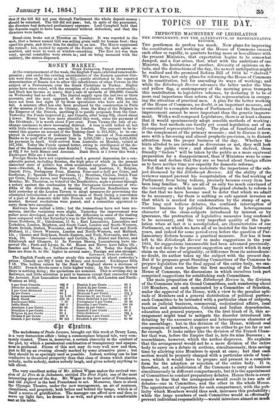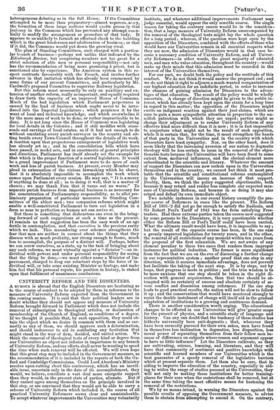TOPICS OF THE
IMPROVED MACHINERY OF LEGISLATION THE COMPLEMENT, NOT THE ALTERNATIVE, OF REPRESENTATIVE REFORM.
THE gentlemen do profess too much. New plans for improving the constitution and working of the House of Commons succeed each other so rapidly, in quarters having more or less alliance with the present Ministers, that expectation begins to be somewhat damped, and a fear arises, that, what with the ambitions of one Minister, the hesitations of another, diversity of opinions on de- tails, and the distractions of the day, the newest anticipation might be realized and the promised Reform Bill of 1854 be " shelved." We now have, not only plans for reforming the House of Commons in its constitution, but for amending its ways of working; and while the Edinburgh Review advances the latter under the blue and yellow flag, a contemporary of the morning press trumpets this contribution to legislative schemes, by declaring it to be of more real importance than reform of the representation in occupy- ing the attention of practical men. A plan for the better working of the House of Commons, no doubt, is an important measure, and is essential to a complete reform of Parliament ; but the functional improvement cannot be more important than the genetic improve- ment. With a well-composed Legislature, there is at least a chance that it would spontaneously adopt sensible methods of working; but the best methods can hardly get sound legislation out of an ill-composed representative body. The plan of functional reform is the complement of the primary measure ; and to discuss it now, save with a far-seeing and almost prophetic prevision, is to disturb attention from the proper business of the day. Whether the hints alluded to are intended as diversions or not, they will look so in the public view ; and should reform be shelved, these friendly "feelers" will be taken by the public as a more equivocal preparation for a disappointment, than if Ministers were to come forward and declare that they are so busied about foreign affairs as to have neither time nor capacity for domestic reforms. Not that we in any degree underrate the importance of the sub- ject discussed by the Edinburgh Review. All the ability of the reviewer cannot prevent his recapitulation of the bad working of Parliament from being tedious, precisely because every item has been long familiar. We are all of us only too much convinced of the necessity on which he insists. The grand obstacle to reform is the fact that we have become used to defer that which we admit to be necessary ; for there is nothing so safe against invasion as that which is marked for condemnation by the stamp of ages. The long and tedious debates, the confused interruption of routine business by political distractions, the heterogeneous character of the cross-subjects introduced by interest or by ignorance, the protraction of legislative measures long confessed to be necessary, and the very imperfect quality of the legis- lation when at last it is accomplished, are characteristics of our Parliament, on which we have all of us insisted for the last twenty years, and indeed for some period even before the question of Par- liamentary Reform became a practical measure. Nor has it been left to the Edinburgh Review to make suggestions in the year 1854, for suggestions innumerable had been advanced previously. We do not deny to the present suggestion any merit which it may claim on the score of originality, or difference from its antecedents : no doubt, its author takes up the subject with the present day. But if he proposes great Standing Committees of the Commons to prepare legislation for the final appeal of the entire body, we can. not forget that even before the first meeting of the Reformed House of Commons, the discussions in which ourselves took part- comprised suggestions for establishing such Committees.
The main proposition of the Edinburgh Review is, the division of the Commons into six Grand Committees, each numbering about. 110 Members, and each nominated by a Committee of Selection, under the approval of the House, with a view to the peculiar apti- tude of Members and a general distribution of political parties; each Committee to be intrusted with a particular class of subjects, such as judicial business, commercial, ecclesiastical affairs, local taxation and administration, Colonial and Indian dependencies, education and general purposes. On the first blush of it, this ar- rangement might tend to mitigate the disorder introduced into debating by the excessive number and heterogeneous character of the assemblage ; but in this division of the House, without real compression of numbers, it appears to us either to go too far or not far enough. It looks rather like the division of the French Cham- ber that was, before the Empire that is, into its nine Bureaux ; a resemblance, however, which the author disproves. He explains that the arrangement would not be a mere division of the entire body to carry on a debate in sections, simultaneously, thus saving time by allowing nine Members to speak at once; but that cash section would be properly charged with a particular circle of busi- ness, which it would have to prepare and present in a complete form for the adoption or rejection of the entire body. It is, therefore, not a subdivision of the Commons to carry on business simultaneously in different compartments, but it is the appointment of Committees to conduct preparatory debates. Hence there is every reason to fear that the arrangement would result in two sets of debates—one in Committee, and the other in the whole House. The appointment of reporters for each compartment, with the pub- licity which Members would thus seek, increases this probability; while the large numbers of each Committee would as effectually prevent individual responsibility—would introduce almost as much heterogeneous debating as in the full House. If the Committees attempted to be more than preparatory—almost superero_ awry, the formation of these large sections would excite precisely that jealousy in the Commons which has prevented any attempt essen- tially to modify the arrangement or procedure of that body. It appears to us unlikely to furnish an effectual check to the babbling which is the great hinderance and adulteration of business ; or that if it did, the Commons would put down the growing rival. The plan of Standing Committees, each charged with a particu- lar branch of business—perhaps not unlike that indicated by the Edinburgh Review, but comprising numbers not too great for a strict selection of able men or personal responsibility—not only has the recommendation of being more promising a priori, but is sanctioned also by experience. The American system in this re- spect contrasts favourably with the French, and invites further advance in that imitation which has already been commenced by some forms of our present Committees, and particularly by Mr. Cardwell's proposed Committee to supervise Railway legislation. But this reform must necessarily be only an auxiliary and ex- tension of another reform, really as important, and equally required to draw forth the capacity of an improved House of Commons. Much of the bad legislation which Parliament perpetrates is caused by the load of business which ought never to be intro- duced into the Imperial Legislature ; which perplexes it by the want of local and technical knowledge, and which overwhelms it by the mere mass of work to be done, or rather impracticable to be done. It is not long since the House of Commons was legislating for local details in the Colonies ; and it still meddles with cross- roads and carvings of local estates, as if it had not enough to do without emulating every parish-surveyor in the country and sit- ting beside every Town-Council throughout the details of its work. A reaction upon that preposterous enlargement of legislative work has already set in ; and in the consolidation bills which have been passed, in model acts, and in enactments of general principle's and directions, Parliament has itself already set the example for that which is the proper function of a central legislature. It would be a grand improvement if Parliament were to do more of such work and less of parish business. At present, every Member may plead in extenuation of the vicious lawmaking which he shares, that it is absolutely impossible to accomplish the work which comes upon Parliament every session. He may say, " It is a mercy if anything be done at all ; as to doing it well, that is a matter of chance ; we may thank Fate that it turns out no worse." To separate parish business from imperial business is as necessary for the concentration of Parliamentary responsibility, as to allot pre- liminary preparation of particular measures to Standing Com- mittees of the ablest men ; two companion reforms which might enable a well-constituted Parliament to turn out legislation in a form as near to perfection as human art can arrive at. But there is something that disheartens one even in the bring- ing forward of such suggestions at such a time as the present. It reminds us that suggestion has been the easy work of an age fertile in contemplation, and that execution is the precious rarity which we lack. This maundering over schemes strengthens the fear that men are neither in earnest about the things that they discuss with so much prolixity, nor strong enough to frame, much less to accomplish, the purpose of a distinct will. Perhaps, before we can screw ourselves, as a state, up to the task of bringing about any such reforms, we must virtually appoint a " dictator "—an in- dividual with powers and under personal responsibility for seeing that the thing be done,—we must either name a Minister of Im- provement, charged to drag our reluctant steps by the force of in- dividual will, or take some existing Minister as hostage, and make him feel that his personal repute, his position in history, is staked upon that fulfilment of unanimous conclusions.



























 Previous page
Previous page